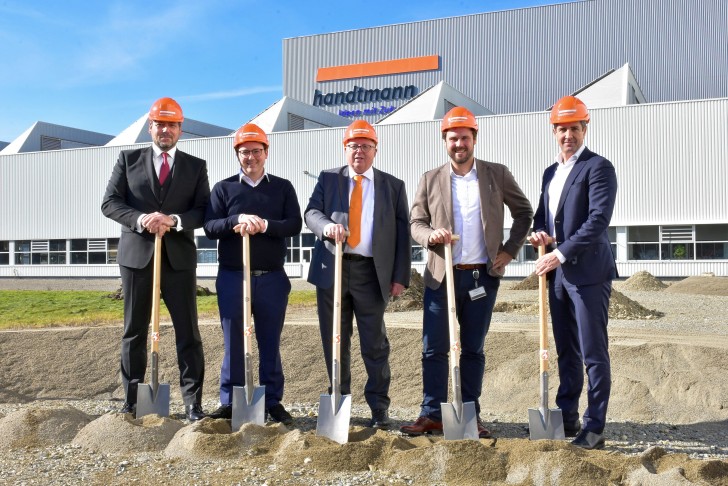Handtmann substantiates growth course with new assembly hall
![]() The Filling and Portioning Systems division (F&P) of Handtmann invests around 14 million euros in the construction of a new assembly hall. The specialist in and market leader for end-to-end technology solutions in the food processing sector is part of the widely diversified Handtmann Group of Companies. With a symbolic groundbreaking ceremony on 16th February, the family-owned company from Upper Swabia substantiated the strong growth course of its thriving filling and portioning technology division.
The Filling and Portioning Systems division (F&P) of Handtmann invests around 14 million euros in the construction of a new assembly hall. The specialist in and market leader for end-to-end technology solutions in the food processing sector is part of the widely diversified Handtmann Group of Companies. With a symbolic groundbreaking ceremony on 16th February, the family-owned company from Upper Swabia substantiated the strong growth course of its thriving filling and portioning technology division.

From left to right: Harald Suchanka (CEO F&P), Markus Handtmann, Thomas Handtmann, Valentin Ulrich (Group Management), Dr. Mark Betzold (CTO F&P)
Handtmann has been developing and producing complex technology, automation and digital solutions for the food processing sector for almost 70 years now. The executive board’s bold growth strategy proves effective. Harald Suchanka, CEO F&P, comments: “We expect continued growth in demand for our sustainable solutions in the coming years. Strong growth driver proves to be the consistent expansion of our portfolio to include new business areas such as customised solutions or the provision of line solutions for comprehensive production processes. The high level of investment in our own subsidiaries and sales companies in the key markets also helps to generate new market share and dynamic sales growth.” Dr. Mark Betzold, CTO F&P, adds: “Expansions and optimisations in the production plants are sensible in order to secure the growth course we have chosen, to be able to meet the increasing demand in the future and not to make compromises in terms of quality and technology. The new assembly hall with an additional floor space of 7,280 m² allows us to realign production and especially assembly and to make it scalable. We are thus further strengthening our competitiveness and market position.”
Valentin Ulrich, grandson of company founder Arthur Handtmann and the fifth generation in the company, was present as a representative of the group management: “The Filling and Portioning Systems division has seen very positive development in recent years. We look ahead with optimism and see ourselves well equipped for the future with the recent modernisation of the production area.” Thomas Handtmann, who leads the company in fourth generation, emphasises: “This investment is also a strong endorsement by the owner families of a long-term commitment to the region”. At the turn of the millennium, the production facilities of the F&P division had been completely redeveloped in the Aspach industrial estate in town of Biberach, Upper Swabia. Following extensions in production and administration and the construction of a new customer and technology centre in 2010, a second customer forum for bakery applications was built in 2014 and a state-of-the-art logistics centre in 2017. Completion of the new assembly hall is expected by the end of 2023.
Substantial investment in new jobs
The expansion of production capacities also brings, new, attractive jobs in modern takt time production to Biberach. “We want to be an attractive employer, offering our employees the best working conditions,” elaborates Markus Handtmann and is convinced: “This new construction puts us in a position to further develop the division successfully and with lasting effect.” Further recruitment is planned for the coming years, not only at the Biberach location, but worldwide, as Harald Suchanka adds: “On an international level, we are also strengthening our workforce in the markets we serve directly through our sales companies. The F&P division has meanwhile grown to around 1,500 employees with a strong upwards trend.”
Family-owned business gives priority to sustainable building
Sustainable action is firmly anchored as a corporate value at Handtmann and receives appropriate consideration when it comes to construction measures. In addition to the installation of a photovoltaic system and extensive green roofs, investments will again be made in the expansion of the utility infrastructure. In-house use of the solar power generated will be boosted by an integrated medium voltage network within the group of companies, just as the waste heat from the production process will be used to heat all of the group’s properties via an integrated heat network. This reduces the use of fossil primary energy and thus the company’s carbon footprint. www.handtmann.de




